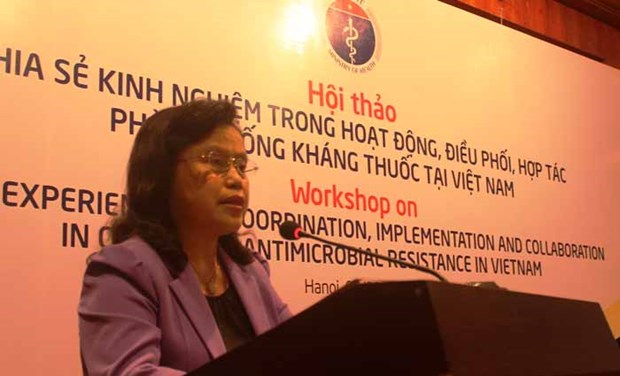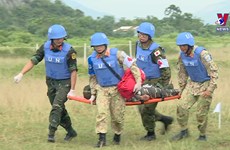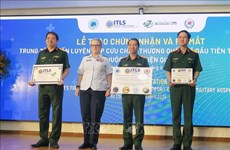Antimicrobial resistance practices shared in Vietnam
Experiences on coordination, implementation and collaboration in combating antimicrobial resistance (AMR) in Vietnam have been shared at a workshop in Hanoi.
 Deputy Minister of Health Nguyen Thi Xuyen speaks at the workshop. (Photo: VNA)
Deputy Minister of Health Nguyen Thi Xuyen speaks at the workshop. (Photo: VNA)Experiences on coordination, implementation and collaboration in combating antimicrobial resistance (AMR) in Vietnam have been shared at a workshop in Hanoi.
Among attendees at the workshop were representatives from the World Health Organisation (WHO), Oxford University Clinical Research Unit (OUCRU) and the United States Centres for Disease Control and Prevention (CDC).
The event, which was organised by the Ministry of Health on September 10, provided a platform for experts in the field to share AMR control practices and propose solutions to effectively implement the national action plan on combating drug resistance in Vietnam.
According to the delegates, the discovery of antibiotics was a turning-point in medical history, as they are used in not only the human health sector but also in farming and breeding.
However, the inappropriate use or abuse of antimicrobial drugs has been associated with an increase in drug resistance, threatening the effective treatment of a growing range of infections, particularly those caused by multidrug-resistant bacteria, viruses or fungi, while also resulting in economic losses, excessively lengthy treatment and high mortality rates.
The attendees believed AMR to be one of today’s prominent global issues, causing millions of deaths and billions of USD in economic losses every year, especially in developing nations.
Vietnam has been accelerating AMR control by devising the national action plan on fighting AMR between 2013 and 2020, establishing a number of AMR supervising bodies and formulating regulations on pharmacy practices, Deputy Minister of Health Nguyen Thi Xuyen said in her remarks.
An aide-memoire on the prevention of drug resistance was signed on June 24 by the Ministries of Health, Agriculture & Rural Development, Industry & Trade, Environment & Natural Resources and Vietnam-based development partners, including the Food & Agriculture Organisation (FAO), WHO, OUCRU and CDC.
Meanwhile, the Ministry of Health, National Institute for Health and Clinical Excellence (NICE) International of the United Kingdom and OUCRU have taken part in a joint project funded by the Newton Fund where British experts support Vietnam to design policies and guidelines on AMR prevention.-VNA













